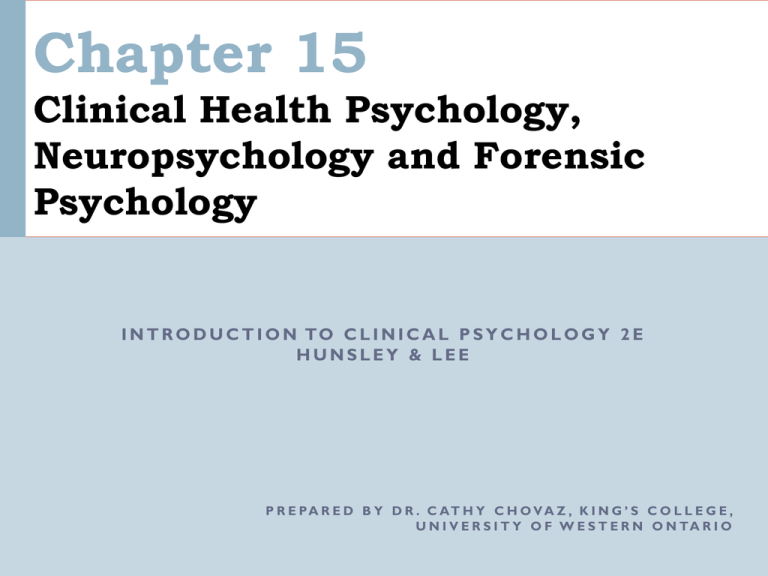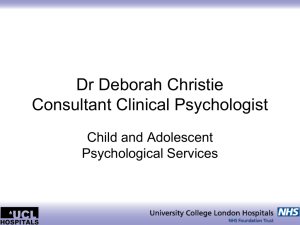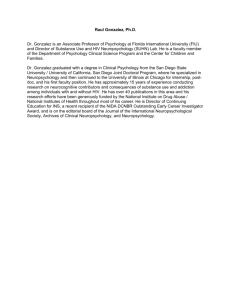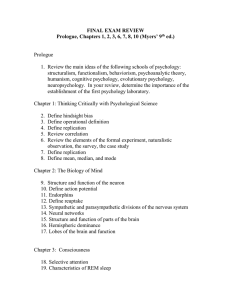
Chapter 15
Clinical Health Psychology,
Neuropsychology and Forensic
Psychology
I N T R O D U C T I O N TO C L I N I C A L P S Y C H O L O G Y 2 E
HUNSLEY & LEE
P R E P A R E D B Y D R . C AT H Y C H O V A Z , K I N G ’ S C O L L E G E ,
U N I V E R S I T Y O F W E S T E R N O N TA R I O
Topics
Clinical Health Psychology
Clinical Neuropsychology
Forensic Psychology
Areas of Knowledge Required for
Registration as a Psychologist in Ontario
Normal Functioning
Biological bases of behaviour
Cognitive affective bases of
behaviour
Social bases of behaviour
Psychology of the individual
Learning
Lifespan development
Personality/individual
differences
Scientific Issues
Research design and
methodology
Statistics
Psychological measurement
Areas of Knowledge Required for
Registration as a Psychologist in Ontario
Professional Issues
Ethical, legal, and
professional issues
Assessment and Case
Formulation
Psychopathology
Psychological
assessment
Psychodiagnostics
Intervention
Intervention procedures;
psychotherapy
Evaluation of change
Clinical Health Psychology
Dramatic increases in medicine and sanitation have
increased life expectancy and the role of behaviors on
health
Definition of disability (World Health Org: WHO-ICF,
2002): impairment, activity limitation and participation
restriction
WHO uses a biopsychosocial model: underscores
integrated parts of individual biology, psychology and
society.
Clinical Health Psychology
Statistics Canada (2007): 4.4 million Canadians reported
that they are limited by health-related problems (a 14.3%
disability rate)
Clinical Health Psychologists focus on the intersection of
the health, behaviour and society
In Ontario, in addition to the requirements noted earlier
(exhibit 15.1 in text), additional specialized training and
knowledge is required in health psychology (behavioural
medicine, developmental psychology)
Clinical Health Psychology
Activities of Clinical Health Psychologists
Work in all manner of settings including community clinics,
hospitals, and private practice
Most work with various health problems including: asthma,
chronic pain, cancer, diabetes, heart disease etc.
Many focus on both assessment and treatment/intervention
Clinical Neuropsychology
Neuropsychology is the study of brain-behaviour
relationships.
Clinical neuropsychology is the assessment and
remediation of problems with the CNS
Clinical neuropsychologists work with a large variety of
patients including those with Alzheimer's, traumatic brain
injury, multiple sclerosis, brain tumours, and Parkinson’s
disease
Clinical Neuropsychology
Clinical neuropsychologists receive training in
Neuroanatomy: normal brain structure and function
Psychopharmacology: the way drugs and environmental toxins
affect the brain
Neuropathology: the way injuries affect the brain
Neuropsych assessment: vast array of tests and assessments
for brain function
Clinical Neuropsychology
Recent imaging techniques (e.g., MRI, fMRI) have
expanded their training to these areas
Examples for neuropsych assessments
Diagnosis (e.g., whether cognitive impairment is related to
depression or injury)
Prognosis (e.g., how will a head injury affect long term
memory)
Treatment planning (e.g., how to help someone with a serious
head injury)
Legal proceedings (e.g., might this person continue to be
violent in the future?)
Clinical Neuropsychology
Canada - a Ph.D in clinical psychology and additional field
training (above and beyond the requirements listed
earlier– Exhibit 15.1 in text)
Testing instruments include all those covered in this class
plus many other specialized tests
Assessment includes testing and other measures (just as
with a typical clinical assessment)
Intervention often focuses on the areas highlighted in
assessment that need remediation or rehabilitation
Forensic Psychology
Forensic Psychology: The application of psychology to
the legal and criminal justice system
Like many other clinical psychologists they engage in
prevention, assessment, treatment and research
In Canada most receive their doctorate in clinical
psychology followed by additional training in forensics
(above requirements noted on p.3)
Employed in a variety of settings including hospitals,
private practice, court clinics, penitentiaries, specialized
facilities
Forensic Psychology
Some activities of forensic psychologists:
Court related assessments
Assessment of witnesses
Assessment of victims
Assessment of the accused
Assessment of disputed parties (child custody)
Assessment of offenders
Treatment services for offenders
Research
Work on prevention programs (e.g., creating a program to
decrease bullying)
Forensic Psychology
Forensic assessment involves most all of the
assessment/tests that we have discussed in this class plus
those targeted to forensic populations, for example:
Psychopathy Checklist-Revised
Violence Risk Appraisal Guide
Intervention usually is focused on decreasing recidivism:
committing crimes after release from incarceration
Copyright
Copyright © 2010 John Wiley & Sons Canada, Ltd. All rights reserved.
Reproduction or translation of this work beyond that permitted by Access
Copyright (The Canadian Copyright Licensing Agency) is unlawful. Requests
for further information should be addressed to the Permissions Department,
John Wiley & Sons Canada, Ltd. The purchaser may make back-up copies for
his or her own use only and not for distribution or resale. The author and
the publisher assume no responsibility for errors, omissions, or damages
caused by the use of these programs or from the use of the information
contained herein.






